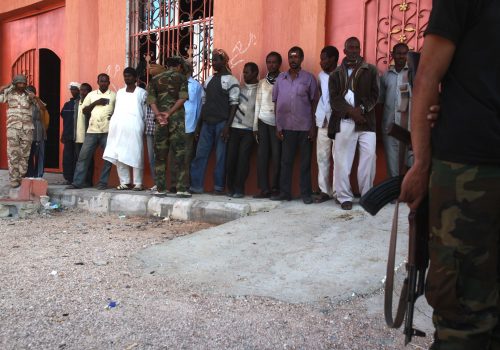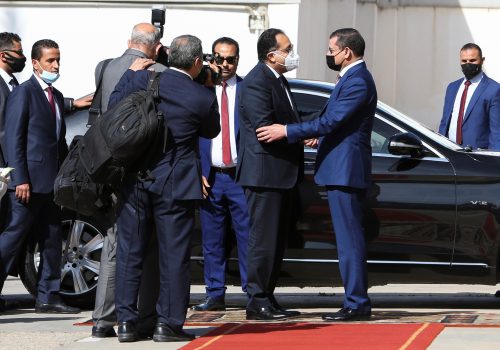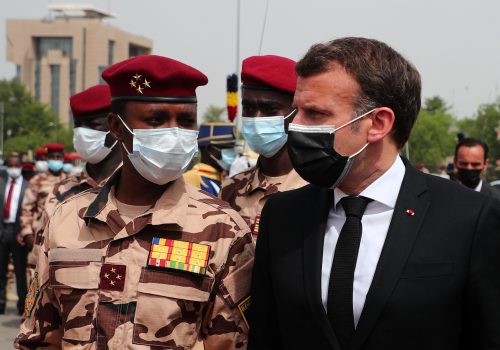Libya’s elections are around the corner. But the country needs a hard reset.
Libya is less than ninety days away from the United Nations-scheduled (UN) presidential and parliamentary elections. They will take place in December amidst a political crisis that grows worse by the day. Without an electoral law or a constitution-based election, the upcoming polls appear nearly impossible to hold. The latest political developments, however, demonstrate the actual seriousness of the crisis.
The House of Representatives—Libya’s parliament—passed a dubious vote of no confidence in the newly established UN-backed Government of National Unity (GNU), throwing the transitional democratic process into disarray. The vote of no confidence has come under scrutiny by parliamentarians, as it only received eighty-nine votes and not the minimum threshold of 120 to legally oust the government.
This latest decision shakes the peace process and derails the UN’s vision of a post-conflict cooperative relationship between the GNU and parliament. It also highlights the already deep divisions present in the fragile transitional environment, after months of political wrangling over the legal basis for elections by the Libyan Political Dialogue Forum (LPDF), a UN-appointed body of seventy-five Libyan representatives aimed at settling rival factions’ political differences.
Additionally, the security situation in Libya has further deteriorated as armed groups continue to clash in Tripoli, the western capital of the internationally recognized GNU, and Benghazi, the eastern home of General Khalifa Haftar’s Libyan National Army (LNA). Benghazi, a city infamous for assassinations, has, in recent months, unsurprisingly witnessed another round of assassinations and abductions of activists by armed groups under the leadership of the rogue general. These actions demonstrate the power of Libya’s armed groups and mercenaries and their ability to undermine authority—elected or otherwise. Despite the glaring power of such groups, the plan to hold elections under such conditions—by any means and irrespective of any consequences—could have serious implications for Libya’s fragile peace.
The Berlin Process
The recent focus on how to hold elections in Libya to avert a political crisis has, unfortunately, diverted attention from the UN’s peace plan, known as the Berlin Process, which has lost direction and purpose since March.
In January 2020, the UN launched the multi-track state-building initiative to end Libya’s civil war sparked by Haftar’s failed April 2019 power grab on Tripoli. The vision for peace and the steps to achieve it were clear: merge rival factions and divided institutions through a multi-track process under a single, unified state, followed by democratic elections to give the country a fresh slate. However, the process has stalled following early progress in establishing a ceasefire in October 2020 and the formation of the GNU in March.
Libya’s local rival factions are primarily responsible for subverting the process to their advantage. Libya’s political and military rivals have either stalled the political track and preparations for elections in order to remain in power indefinitely, or stalled the military track to maintain their structures and power following the elections.
At the political level, Libya’s two rival legislative bodies in the House of Representatives—elected in 2014—and the High State Council (HSC)—appointed by the UN at the end of Libya’s first civil war in 2015 to advise parliament—have failed to agree on a timeline to hold a constitutional referendum before the December elections. The LPDF’s seventy-five members—half of whom are members of parliament and HSC—were appointed as part of the Berlin Process in October 2020 to designate a unity government and generate consensus over the legal and political rifts between the rival legislative bodies.
They have failed to agree on a sound constitutional basis that would establish political checks, institutional balances, and organize power between the parliament, presidency, and military ahead of elections. As a result, Aguila Saleh, the speaker of Libya’s parliament and close ally of Haftar, issued a draft electoral law on September 9 without a vote or a constitutional basis to define the power of Libya’s next head of state—which controversially allows military officials to put forward their candidacy—sparking outrage from parliamentarians.
The sequencing and weaponization of the process is reflected in Haftar’s enthusiasm for elections and his adversarial posture to the military track tasked with unifying all military forces under the command of the unity government’s civilian presidency, known as the Presidential Council (a three-person body appointed by the LPDF to represent a balance of Libya’s three geographical regions). Haftar, who famously claimed Libya was not ripe for democracy, has now temporarily stepped down from his position as leader of the LNA to prepare a presidential bid ahead of the December elections. If Haftar wins, his opponents will likely question the integrity of polls in the east, where civilians live under a tightly-controlled police state, and claim that the general has stuffed ballots, potentially sparking a war. If Haftar loses, he will return to his self-styled position as the leader of the LNA and continue to stall the military track and state-building process.
Thus, win or lose, Haftar is positioning himself to remain a powerful figure in post-election Libya, posing a danger to the peace process, constructive civil-military relations, and the prospects of a future functioning democracy. This is evidenced in the last three months, as Haftar rejected any attempts by the UN’s military track to issue orders to the LNA, and even appointed military officials to new ranks in defiance of the Presidential Council’s orders.
Haftar’s actions questioned the principle of civilian authority and the entire premise of the peace talks. More troubling, the general deployed his forces to southern Libya in June and closed the Algerian border to capture strategic territory and demonstrate his force, violating the UN-brokered ceasefire agreement and the orders of the Presidential Council again. Haftar’s stalling and damaging of the military track is based on a deeper rejection of years of attempts to make his armed groups subservient to civilian authority. This was most recently evident in September, when Haftar underlined civilian authority by publicly stating his refusal to subject his forces to any authority during a military parade in eastern Libya. This should be a stark warning for those considering the military ruler’s democratic credentials or the future of civil-military relations in a post-elections Libya.
A hard reset
The reality is that Libya needs a hard reset. Luckily, the answer to the current crisis can be found in the design and original sequencing of the Berlin Process. First, the UN should condition elections on progress across all tracks of the Berlin Process, including at the political and economic levels, but with a priority at the military level to establish a subordinate military force. The Berlin Process mandates a comprehensive demobilization and disarmament of Libya’s armed groups and mercenaries—without exception—and their integration into institutions tasked with serving Libya’s next elected parliament and presidency.
Foreign mercenaries—acting allegedly on behalf of Russia and the United Arab Emirates—are accused by a UN panel of committing war crimes, in addition to Turkey’s official forces—that reportedly include mercenaries deployed to Libya under an agreement and request of the former UN-backed unity government—must be fully withdrawn from Libya as per the UN-brokered ceasefire agreement signed in October 2020.
Both processes should be a precondition of holding elections to ensure respect of the outcomes and should include the GNU’s armed groups, city-state brigades, and Haftar’s LNA (often mistaken for a regular military but primarily composed of tribal forces, radical Salafis, and armed criminal groups that possess a track record of war crimes and insubordination). The process should be sequenced to maintain balance, but also be exhaustive to establish a security sector that will respect the results of the December elections and serve Libya’s next elected political authority.
If the UN is genuinely committed to a democratic outcome, it must return to the Berlin Process with a focus on more than just a soft political reset via the December elections. Libya requires a hard reset in regard to the mercenaries, militias, and structures responsible for conflict in order to ensure free, fair, and respected elections that sustain—instead of breaking—the fragile peace in Libya.
Anas El Gomati is the founder and director of the Sadeq Institute, the first public policy think tank established in Tripoli, Libya.
Image: On the front line of Al Swani during the battle, two fighters of the 610 Brigade (GNA) are passing a revolver from hand to hand. Since April, the Libyan National Army (LNA) led by Khalifa Haftar is attempting to take control of Tripoli defended by the forces of UN-backed recognised Government of National Accord of Fayez el-Sarraj (GNA). Libya, outskirts of Tripoli, December 6, 2019. Sur la ligne de front de Al Swani pendant les combats, deux combattants de la brigade 610 (GAN) se passe un revolver de la main a la main. Depuis avril, l'armee nationale Libyenne (LNA) dirigee par Khalifa Haftar essaie de prendre le control de Tripoli defendu par les forces du gouvernement d'accord national de Fayez al-Sarraj, soutenu par l'onu (GAN). Libye, banlieue de Tripoli, 6 decembre 2019.NO USE FRANCE


